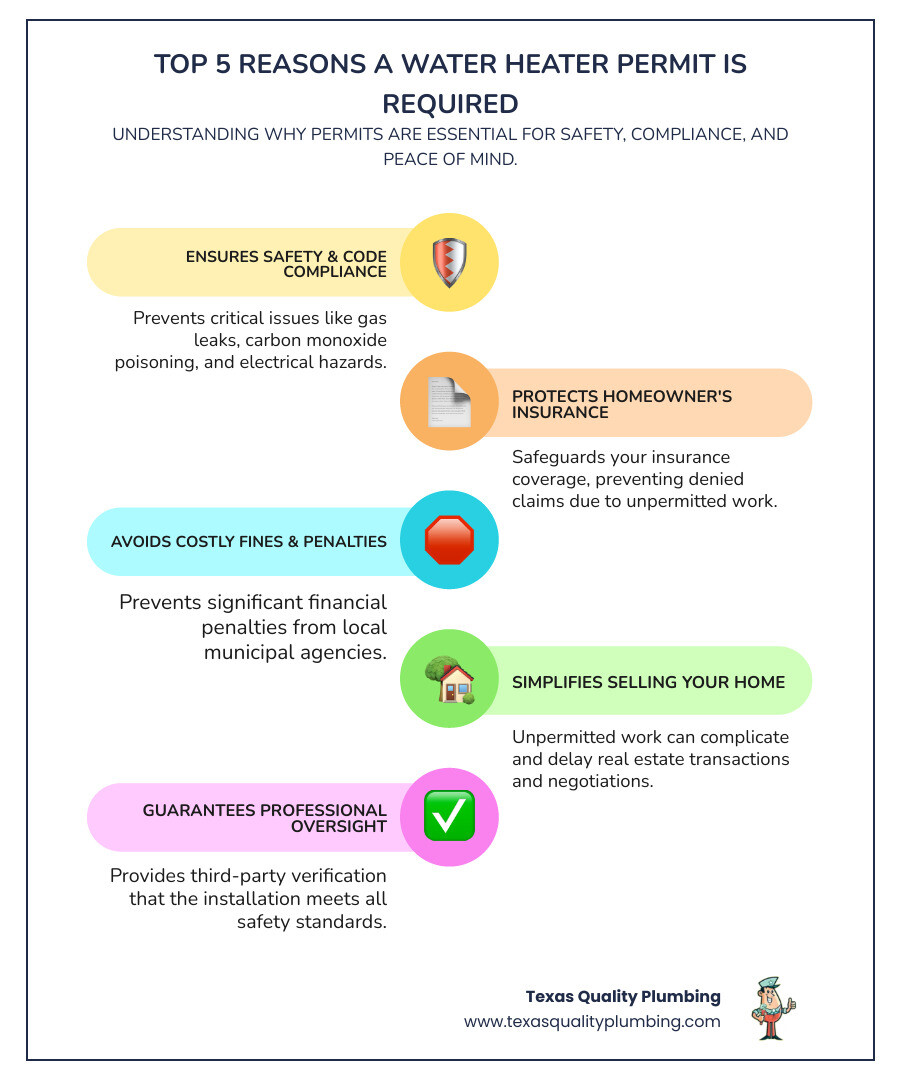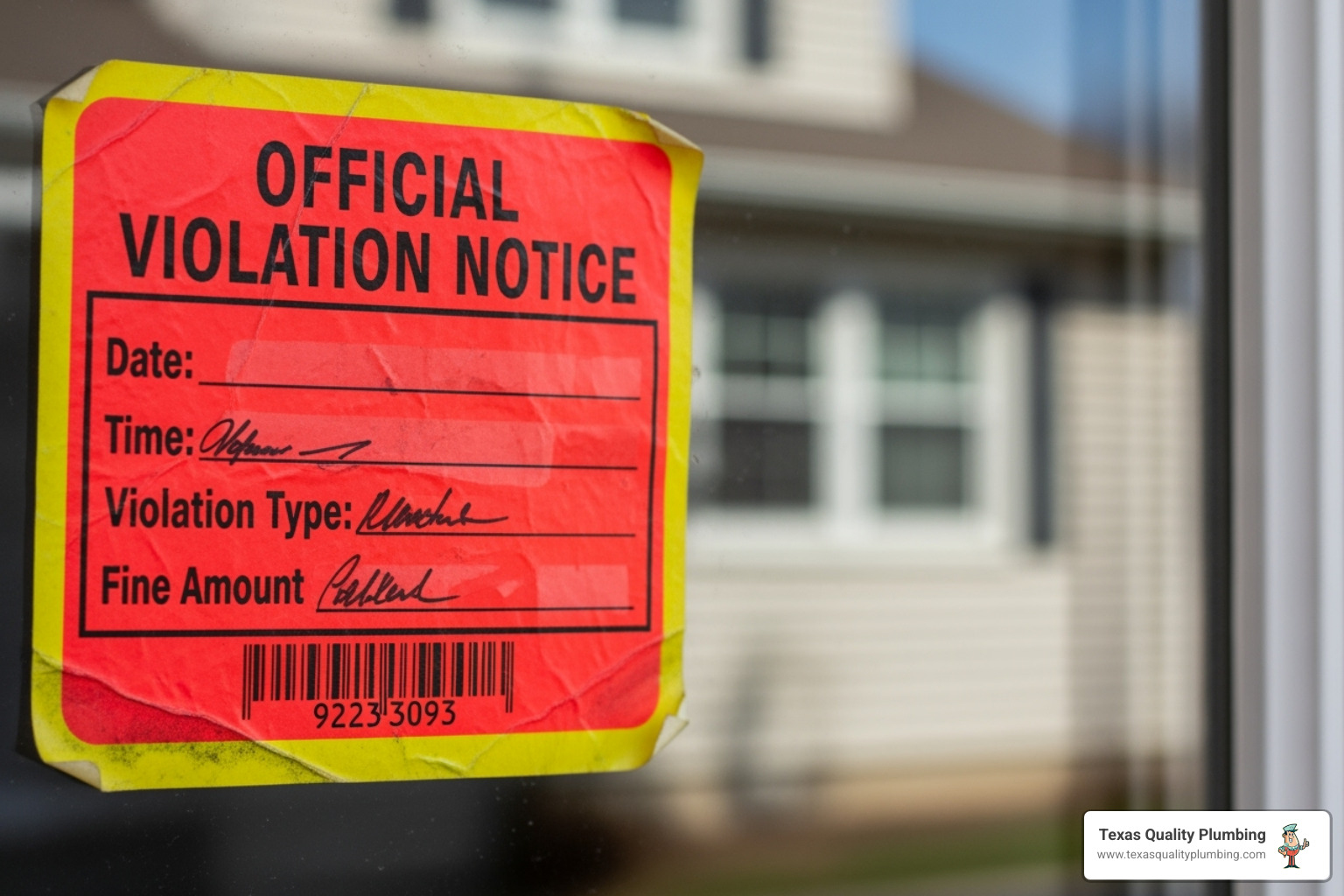Understanding Water Heater Permits
If you’re asking yourself, do I need a permit to install a water heater, the short answer is almost always yes. This can be surprising for many homeowners. But it’s a critical step that ensures safety and compliance for one of your home’s most important appliances.
The quick answer:
- Yes, a permit is typically required. This applies to both new installations and replacements.
- Permits ensure your water heater meets local safety and building codes.
- Ignoring permits can lead to big problems with safety, insurance, and even when selling your home.
Many homeowners find themselves in this exact situation. An old water heater can fail quickly, leaving you without hot water. In the rush to get things fixed, permits might seem like an extra hassle.
But taking the time to understand permit requirements is crucial for your safety and peace of mind. It protects your home, your family, and your investment.
This guide will walk you through why permits are so important, what happens if you skip them, and how to make sure your water heater installation is done right.
Why a Permit is More Than Just Paperwork
When we talk about getting a permit for your new water heater, it’s easy to think of it as just another piece of paper, another hoop to jump through. But trust us, it’s so much more! It’s about keeping your home and family safe and sound.
Think about it: your water heater isn’t just a simple appliance. It’s a powerhouse connected to your home’s plumbing, gas, and electrical systems. If anything goes wrong with these connections, the consequences can be serious. We’re talking about real dangers like gas leaks, carbon monoxide poisoning, and even electrical hazards or massive water damage. These aren’t just minor headaches; they can be life-threatening.
That’s why permits are so important. They ensure your installation meets strict safety regulations and code compliance. This professional oversight helps prevent those scary scenarios. For example, a properly installed Temperature and Pressure (T&P) relief valve is key to preventing explosions. It’s all about making sure everything works perfectly and safely. By the way, if you’re curious about the different kinds of water heaters out there, check out our guide on Types of Water Heaters. The Texas State Board of Plumbing Examiners (TSBPE) works hard to set these high standards across our state, protecting every homeowner.
The Critical Role of Safety Codes
Safety codes are like the superhero rules for water heater installation. They make sure everything is put together correctly to avoid accidents. For instance, if you have a gas water heater, getting the gas line connections just right is super important to prevent dangerous leaks or fires. You definitely don’t want a rogue gas line!
And for electric models? It’s all about having a dedicated circuit with the correct electrical wiring – we’re talking specific wiring like 10-gauge copper wire and a strong 30-amp double pole breaker. This prevents electrical fires and keeps everything running smoothly.
Beyond the power source, codes also cover things like proper venting. This is crucial for safely pushing out harmful combustion gases, like the silent and invisible killer, carbon monoxide. Nobody wants that lurking around. Codes also demand a T&P relief valve (that’s the safety valve that prevents your tank from becoming a rocket from too much pressure) and a blow-off pipe to direct any discharge safely away. Sometimes, you might even need an expansion tank to manage water pressure management or a vacuum relief valve to keep the tank from collapsing.
And let’s not forget the basics: ensuring the structural support for your water heater is solid and that your overall plumbing system is healthy. Good pipes are essential! You can dive deeper into the different types of pipes in our Houston Plumbing: Types of Pipes guide. These codes aren’t just suggestions; they’re vital guidelines designed to protect you and your loved ones.
Ensuring a Professional, Inspected Installation
So, you might be wondering, how does a permit actually help ensure safety? Well, it makes sure your water heater isn’t just “good enough.” It requires a third-party verification through an inspection process. This means a qualified inspector comes out to check that everything – every pipe, every wire, every connection – meets all the local and state plumbing, gas, and electrical codes. It’s like having an independent expert give your installation a big thumbs-up.
For peace of mind, most cities, including our friends in Houston, Cypress, and Katy, require a Licensed Master Plumber to be the one who pulls the permit. These pros are like code wizards! They know all the ins and outs, from updated ventilation rules to getting the gas line sizing just right (did you know tankless water heaters often need a bigger gas line than traditional ones?). They also know about important details like needing a drip pan if your water heater is in a living area to prevent water damage.
This professional oversight and the inspection that follows are what truly future-proof your water heater. It gives you official, documented proof that the work was done safely and correctly. This is super valuable, especially if you ever decide to sell your home down the road. Buyers love seeing that everything is up to code! For a peek into what a professional installation involves, check out our guide on Water Heater Installation. It really takes the guesswork out of things.
The High Cost of Cutting Corners: Consequences of No Permit
We get it—when your water heater fails and you’re facing cold showers, the permit process might feel like unnecessary red tape. But here’s the truth: skipping that permit can cost you far more than you’d ever save. The consequences of unpermitted work create a domino effect that can impact your finances, safety, and peace of mind for years to come.
Local agencies take permit violations seriously. When they find unpermitted work, you’re looking at hefty fines that can run hundreds of dollars per day. These aren’t just one-time penalties either—they keep adding up until you fix the situation. In extreme cases, unpaid fines can result in a lien against your property, which affects your ability to sell or refinance your home.
But money isn’t the only concern. The real danger lies in what those permits are designed to prevent. Without proper inspection, critical safety issues can go unnoticed. We’ve seen homes where improper gas connections created explosion risks, faulty electrical work sparked fires, and inadequate venting allowed carbon monoxide to build up in living spaces. These aren’t scare tactics—they’re real scenarios that proper permitting and inspection help prevent.
How Unpermitted Work Affects Homeowner’s Insurance
Here’s where things get really expensive. Your homeowner’s insurance policy likely has specific language about unpermitted work, and it’s not in your favor. When you file a claim related to your water heater—whether it’s water damage from a leak or fire damage from faulty installation—the first thing insurance adjusters check is whether the work was properly permitted.
If they find the installation was done without permits, your claim can be denied outright. Even worse, some insurance companies will void your entire policy if they find unpermitted work contributed to the damage. This leaves you personally responsible for potentially massive repair costs and any liability if someone gets hurt.
We’ve worked with homeowners who thought they were saving a few hundred dollars by skipping permits, only to face tens of thousands in uncovered damages later. The documentation from a proper permit and inspection provides crucial proof of compliance that protects your coverage. If you’re concerned about an existing water heater’s condition, our guide on When to Call for Water Heater Repair can help you assess when professional attention is needed.
Selling Your Home with an Unpermitted Water Heater
Planning to sell your home someday? An unpermitted water heater can throw a serious wrench in those plans. Home inspectors are trained to spot unpermitted work, and they will flag it in their reports. Once that happens, you’re dealing with a cascade of complications that can derail your sale.
Buyers get nervous when they see unpermitted work—and rightfully so. They might demand that you obtain retroactive permits and inspections before they’ll proceed with the purchase. Sometimes they’ll ask you to completely redo the installation with proper permits. Other buyers will use the unpermitted work as leverage to negotiate a lower price or walk away entirely.
Texas disclosure laws also require you to inform potential buyers about known defects or issues. Failing to disclose unpermitted work can lead to legal problems even after the sale closes. We’ve seen deals fall through at the last minute because of unpermitted water heater installations that seemed like a good idea years earlier.
The process of getting retroactive permits is possible if the work was done correctly, but it adds stress and expense during an already complicated time. It’s always easier and less costly to do things right from the start. For homeowners looking to improve their systems before selling, our article on Updating Water Heater Efficiency in Houston offers valuable insights.
So, Do I Need a Permit to Install a Water Heater in Texas?
Let me give you the straight answer: do I need a permit to install a water heater in Texas? Yes, absolutely. Whether you’re in Houston, Cypress, Spring, Katy, or Sugar Land, you’ll need a permit for water heater installation or replacement. It’s not just a suggestion—it’s the law.
Here’s why Texas takes this so seriously. The state plumbing code exists to protect public health and safety. When you think about it, your water heater connects to your home’s plumbing, gas, and electrical systems. That’s a lot of potential for things to go wrong if the installation isn’t done right.
The Texas State Board of Plumbing Examiners (TSBPE) oversees these requirements at the state level, while local municipalities enforce them. In fact, any Texas city with more than 5,000 residents must adopt a plumbing ordinance. That covers pretty much everywhere you’d want to live.
Houston makes this crystal clear on their official website. The city explicitly requires a plumbing permit for water heater replacement and installation. You can verify this yourself by checking the Houston Permitting Center’s Water Heater information page.
The Permit Process in Houston: A Step-by-Step Guide
Getting a water heater permit in Houston is actually more straightforward than many homeowners expect. The key thing to understand is that a licensed Master Plumber typically handles the entire permit process for you. Here’s how it works from start to finish.
Your Master Plumber takes responsibility for obtaining the permit. They’re registered with the City of Houston and know exactly what’s required. This isn’t just convenient—it’s often mandatory for water heater installations.
The application gets submitted through Houston’s iPermits portal, where your plumber completes the CE-1020 Plumbing Building Permit Application. The good news? For single-family homes, there’s usually no formal plan review required. This keeps things simple and speeds up the process.
Once the application is processed and fees are paid, the permit gets issued. Your Master Plumber then installs the water heater according to all local and state codes. After installation, they schedule an inspection through the city’s online system or by phone.
The final step is the actual inspection. A city inspector visits your home to verify everything meets code requirements. When it passes—and it will when done by a professional—you get official documentation of a safe, compliant installation.
We handle this entire process for our customers, making sure everything goes smoothly from application to final inspection. If you’re dealing with any plumbing issues, it’s always smart to consult with professionals who understand local requirements. Check out our guide on Houston Plumbing Concerns? Call a Pro! for more insights.
Are there exceptions to needing a permit to install a water heater?
This is where things get a bit nuanced. While full water heater replacement always requires a permit, there are some minor plumbing repairs that don’t. These are called “ordinary repairs” or “ordinary maintenance.”
Small leak repairs, faucet replacements, and toilet valve repairs typically don’t need permits. You can also usually replace garbage disposals, toilets, sinks, or tubs without a permit, as long as you’re not changing the pipe arrangement.
But here’s the important part: replacing a water heater isn’t considered ordinary maintenance. Even if you’re doing a direct swap with the same type of unit in the same location, most municipalities still require a permit. The reason? Water heaters involve gas, electrical, and pressure connections that pose serious safety risks.
What about emergencies? Some areas have provisions for emergency installations when your water heater fails unexpectedly. You might be allowed to make the emergency repair and then obtain the permit within 72 hours. However, you must notify the Building Department immediately and schedule all required inspections as soon as possible.
The bottom line is this: don’t assume you can skip the permit just because you’re replacing an existing unit. The safety stakes are too high, and the consequences of unpermitted work are too severe.
If you’re considering different water heater options, including tankless models, understanding these permit requirements is crucial. Our article on Tankless Water Heater Basics Houston Homeowners Should Know covers the specific considerations for these efficient systems.
What documentation do I need to get a permit to install a water heater?
When it comes to permit documentation, having the right paperwork ready makes the process much smoother. While requirements can vary slightly between municipalities, there are some standard items you’ll need.
The application forms are your starting point. In Houston, that means the CE-1020 Plumbing Building Permit Application. Your licensed Master Plumber will handle this, but they’ll need information from you to complete it properly.
Property owner details are essential—your name, address, and contact information. If someone other than the property owner is applying, you might need an “Authorization to Act on Behalf of a Property Owner” form.
Unit specifications matter too. The inspector needs to know the make, model, capacity, fuel type, and BTU rating of your new water heater. This helps them understand what specific safety requirements apply to your installation.
Your Master Plumber’s information is crucial. Their license number, business name, and contact details must be included, and they must be registered with your local municipality. This ensures the work will be done by someone qualified and accountable.
In some cases, you might need a simple site plan showing where the water heater will be located, especially if you’re changing its position significantly from the old unit.
Here’s the good news: when you work with a reputable plumbing company like Texas Quality Plumbing, we handle most of this paperwork for you. We make sure everything is submitted correctly and efficiently, so you don’t have to worry about missing documentation or filing errors.
The permit process might seem complicated, but it’s really about ensuring your safety and protecting your investment. For more guidance on selecting the right water heater for your home, take a look at our comprehensive guide on Choosing Water Heaters in Houston.
Frequently Asked Questions about Water Heater Permits
Can a homeowner pull their own water heater permit in Texas?
This is one of the most common questions we hear from Houston homeowners, and the answer is a bit more complicated than you might expect. Do I need a permit to install a water heater as a homeowner doing the work myself? The short answer is yes, you still need a permit, but whether you can pull it yourself depends on where you live.
In Texas, homeowners can often pull permits for plumbing work on their owner-occupied single-family home. The key phrase here is “owner-occupied”—you have to actually live in the house. This means if you’re handy and want to tackle the installation yourself, you might be able to apply for the permit.
But here’s where it gets tricky. Even if you pull the permit yourself, the work must still meet all local and state plumbing codes and pass inspection. Water heater installations aren’t simple projects. They involve complex connections to gas lines, electrical systems, and water supply—all of which require specialized knowledge to ensure everything is safe and up to code.
In Houston specifically, the city’s regulations require that the permit must be obtained by a Master Plumber registered with the City of Houston. This effectively means that within Houston city limits, a licensed professional typically needs to handle both the permit application and the installation work.
While you might have the legal right to pull a permit in some areas, we strongly believe the safest and smartest route is having a licensed Master Plumber handle everything. They know the latest codes inside and out, have the right tools, and can spot potential problems before they become dangerous or expensive issues.
What happens during a water heater inspection?
After your new water heater is installed, there’s one final step in the permitting process: the inspection. This isn’t just a quick look-over—it’s a thorough examination where a municipal inspector verifies that everything was installed correctly and safely.
The inspector will start by confirming that a valid permit was obtained for the work. Then they’ll dive into checking that the installation meets current plumbing, gas, and electrical codes. This includes verifying proper sizing of gas lines, correct gauge of electrical wiring, and appropriate circuit breakers for your specific unit.
Safety devices get special attention during the inspection. The inspector will carefully examine the Temperature and Pressure (T&P) relief valve, making sure it has a proper blow-off pipe that directs any discharge to within 6 inches of the floor. They’ll also check for a vacuum relief valve on the cold water line above the tank—these small details can prevent big problems.
For gas water heaters, proper venting is absolutely critical. The inspector will examine the flue pipe to ensure it’s correctly installed, properly sloped, sealed, and adequately sized to safely expel combustion gases outside. They’ll also look for any signs of backdrafting, which could allow dangerous gases back into your home.
If your water heater is located where leaks could cause damage—like in an attic, closet, or above finished living space—the inspector will verify that a proper drip pan is installed beneath the unit, complete with a drain line leading to an approved discharge location.
The inspector will also check that all water and gas line connections are secure and leak-free. In areas prone to seismic activity, they’ll verify that the water heater is properly strapped or anchored to prevent tipping during an earthquake.
If everything passes inspection, the permit gets signed off and you receive official documentation proving your water heater is installed safely and to code. If something fails, don’t worry—the inspector will provide a detailed list of what needs to be corrected before scheduling a re-inspection.
Does a permit for a tankless water heater differ from a traditional one?
The permit application process for a tankless water heater is essentially the same as for a traditional tank unit—you still need to apply for a plumbing permit, and the installation still requires an inspection. However, what the inspector focuses on can be quite different because tankless units have unique requirements that are often more complex.
Tankless water heaters are hungry for fuel. They typically have much higher BTU ratings than tank heaters—often 150,000 to 200,000+ BTUs compared to 30,000-40,000 for tank units. This means they need a larger gas line, often 3/4-inch or even 1-inch diameter, to deliver sufficient fuel. An inspector will carefully verify this sizing because an undersized gas line can cause poor performance or even safety issues.
Venting requirements are completely different for tankless units. They require specialized venting systems, often made of PVC or stainless steel, that are much different from the standard B-vent used for tank heaters. The inspector will check proper termination, slope, and materials to ensure combustion gases are safely expelled.
Even gas Tankless Water Heaters need electricity to power their ignition and control systems. This often requires a dedicated electrical circuit, which means both electrical work and electrical inspection in addition to the plumbing permit.
Many high-efficiency tankless units produce condensate—a slightly acidic byproduct that needs to be safely drained to an approved location. The inspector will verify that proper condensate drainage is in place to prevent damage to your home.
Because of these more complex requirements, installing a tankless water heater is rarely a DIY project and almost always requires professional expertise. The permit and inspection process ensures all these crucial differences are properly addressed, guaranteeing your tankless unit operates safely and efficiently for years to come.
Conclusion: Ensure a Safe and Compliant Installation
We get it. When your water heater calls it quits, the last thing you want to think about is paperwork and inspections. You just want that glorious hot water back! But as we’ve found together, understanding do I need a permit to install a water heater isn’t just about ticking a box. It’s a really important step that keeps your family safe, protects your home, and guards your valuable investment.
Think of a permit as your home’s superhero shield. It helps protect you from all sorts of trouble, like dangerous gas leaks or electrical shocks. Plus, it makes sure your homeowner’s insurance stays valid – a huge relief if anything goes wrong. And when it comes time to sell your home, a permitted installation means no last-minute headaches. The small effort of getting a permit truly outweighs the big problems you could face without one, like hefty fines, denied insurance claims, or even serious safety risks. Seriously, cutting corners just isn’t worth it.
Here at Texas Quality Plumbing, we’re all about making things easy and safe for you. We offer efficient, reliable, and most importantly, safe plumbing services all across the Houston area, including Cypress, Spring, Katy, Sugar Land, Richmond, Pasadena, Humble, Tomball, Friendswood, Jersey Village, and Bellaire. Our whole approach is centered around you, our customer. That means we respect your time, show up when we say we will, and make sure your repairs and installations are top-notch and done right.
So, when it’s time for a new water heater, let us handle everything. For a truly seamless and code-compliant water heater installation in the Houston area, trust the friendly experts at Texas Quality Plumbing. We’ll take care of every single detail, including navigating the permit process for you. That way, you can rest easy knowing your new water heater is installed perfectly, safely, and exactly to all the local rules. You’ll have reliable hot water, and most importantly, complete peace of mind for many years ahead.





